Search the Special Collections and Archives Portal
Search Results
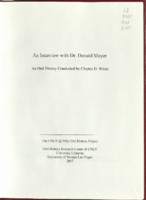
Transcript of interview with Dr. Donald Moyer by Claytee D. White, April 17, 2007
Date
2007-04-17
Archival Collection
Description
Dr. Donald Moyer was born on a farm in Central Illinois. His parents were farmers, but moved to Decatur, Illinois, when Donald was six. Consequently, he went to grade school and high school in Decatur. He then earned a bachelor's degree at the University of Illinois in Champaign, Illinois. His master's and PhD were taken in psychology at the University of Chicago. Dr. Moyer has had a long and illustrious career. After college he helped raise money and students for the University of Chicago and then moved to Portales, New Mexico as director of finance for higher education in the state government. He next served as president of Eastern New Mexico University for five years. From there he came to UNLV in 1965 as chancellor/president, a position he held for 3 years, and worked in marriage and family counseling for almost 30 years right here in Las Vegas. He spent a year in the Los Angeles area doing commercial psychology, and then became vice president at University of Alaska, working there for 7 years. While president, Dr. Moyer focused much of his energy getting regents, community members, and the faculty and student body to recognize the needs of the university. His wife's contributions to this effort were invaluable, as she made their home a warm and inviting place. By bringing these people together into a cohesive unit, monies could be raised to add buildings, staff, and schools that would enhance the quality of education, raise the reputation of the university, and develop UNLV into a leading institution. Much of Dr. Moyer's work during his time as president was "emancipating" UNLV from UNR. This meant creating a faculty senate working only for UNLV, having regents who really represented UNLV, and finding people in the community who would volunteer time and money to carry out the vision of a great university. Today Dr. Moyer and his wife enjoy living in Las Vegas. They stay current on what's happening at UNLV by attending meetings for retired faculty and administrators. Their two daughters have moved to Las Vegas as well, so they have a rich social and family life. He still practices marriage and family counseling, and sees UNLV as a school which will continue to grow in reputation and stature.
Text
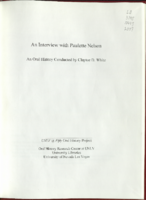
Transcript of interview with Paulette Nelson by Claytee D. White, March 2, 2009
Date
2009-03-02
Archival Collection
Description
Paulette R. Nelson's life in Las Vegas is a contrast of images. She recalls riding her horse across the wide-open desert, as well as embracing the technological changes that rapidly impacted the UNLV library. Paulette honed her life skills as farm girl growing up just south of Mandan, North Dakota. She attended North Dakota State University. A post-graduation summer as a volunteer in Kenya, sparked an interest in adventure and travel and she enlisted for four years in the U.S. Air Force. Rather than enter as an officer, she opted to be enlisted personnel so that she could receive technical training. In 1981, Paulette migrated to Las Vegas, where she had friends at Nellis Air Force Base. She worked at the Nevada Test Site for the next two years. Then, while looking for a new job so that she could pursue an engineering degree, she was offered a position in the UNLV library cataloging department. It was a career path change that she never regretted. She eventually became the Supervisor of the Architecture Studies Library; a position she held for nine years until her retirement Among the highlights of her career was being involved in the change to an electronic catalog system and being on the planning committee for Lied Library.
Text
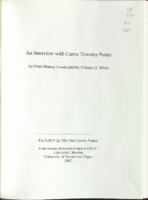
Transcript of interview with Carrie Townley Porter by Claytee D. White, February 7, 2006
Date
2006-02-07
Archival Collection
Description
Carrie Townley Porter, a 6th generation Texan, was born in Central Texas near present-day Fort Hood. Her father, a highway patrolman, was called into the Army Reserve in 1940 and spent some years moving around the country. At one point, his wife and children stayed in Belton, Texas tor three years because her father was transferred to places they couldn't go. Carrie finished high school in Austin, Texas, and attended two years at University of Texas in Austin. She left college to get married, and she and her geologist husband lived in Kansas, Oklahoma City, and Albuquerque. He took a job with the Atomic Energy Commission that required frequent trips to the Nevada Test Site, so the suggestion was made that they just move to Las Vegas. At this point they had three children with no reliable child care so Carrie became a housewife for a while. The Townleys lived a full and active life in Las Vegas and she eventually got hired as a substitute teacher. Carrie mostly subbed at Gibson Junior High School. She decided to finish her degree at Nevada Southern University (now UNLV) after her principal told her that if she could do that, he would have a job waiting for her. Several of the courses that Carrie took were Nevada history correspondence courses from UNR. These courses were prepared and graded by Dr. Russell Elliott. Carrie also fondly remembers two Nevada Southern history professors in particular, Dr. John Wright, whom she considered a mentor, and Rosemary Masick, who taught English history. After receiving her bachelor's, Carrie returned to teaching math at Gibson Jr. High. She started an archaeology club on her own and she and Russ Elliott started the first Trailblazer Club (junior history) in the state. She got students involved in the history of the Native Americans in the area and took them on field trips which gave them a chance to participate in a dig. Carrie has worked in Special Collections in the UNLV library as an archivist, with Sierra Pacific Power Company as a records analyst, and at Caesar's Tahoe as records administrator. She has also been very deeply involved with the Nevada Women's History Project since 1994. This group was responsible for the Sarah Winnemucca Statue Project, which placed a statue of this Native American in Washington, D.C., and a copy of it in the capitol building in Carson City. Today Carrie is doing a collaborative book on Helen J. Stewart with Sally Zanjani. She has done extensive research on Helen Stewart's life, and to this day makes "living history" presentations dressed as Helen J. Stewart. In addition to her history commitments, Carrie still holds onto her records management consulting firm, which she started in 1985.
Text
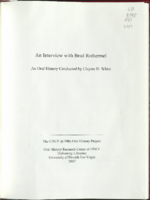
Transcript of interview with Brad Rothermel by Claytee D. White, July 31, 2006
Date
2006-07-31
Archival Collection
Description
Dr. Brad Rothermel gives a brief introduction to his childhood days in Monroe Center, Illinois. He was born into a family of educators, so it was natural that he completed a Bachelor's, and finally a doctorate. He attended Northern Illinois University in De Kalb for his undergraduate degree and the University of Illinois for his Master's and PhD. Dr. Rothermel's work history before arriving at UNLV in 1981 includes coaching in the Chicago Cubs organization and stints at Kansas State and West Virginia University as athletic director and business manager. He describes how he came to apply at UNLV and comments at length on the responsibilities of an athletic director. Brad goes into minute detail discussing the history of the athletic programs at UNLV. His memories of coaches, players, and memorable wins are as compelling as his descriptions of fundraising, an average day as athletic director, and outstanding figures in the UNLV sports scene. After retiring in 1990, Brad's association with UNLV sports did not end, but rather evolved into consulting, developing, and fundraising. He and his wife Suzanne continue to enjoy and appreciate their involvement with community, the university, and their children and grandchildren.
Text
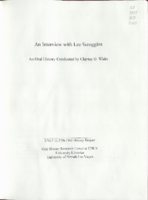
Transcript of interview with Lee Scroggins by Claytee D. White, February 27, 2009
Date
2009-02-27
Archival Collection
Description
From a Montana childhood filled with memories of sub-zero winters to a whirlwind courtship and wedding to her husband of over three decades, Lee Scroggins brought an energy to all her administrative positions at UNLV. Lee and her family moved to Las Vegas in March 1980. Within a couple of months she was working at UNLV and except for a brief hiatus in the late 1980s she remained at the university until her retirement in 2009. She gives an account of her journey through the office staff levels she held. It began with a brief stint in the Education department (you couldn't rise a level until you had six months in one position); took her to the Business and Economics departments; the 1980s. After her hiatus from 1985 to 1988, she returned to UNLV to work in the Psychology department and eventually to the library. Her interview traverses the evolution of the administrative worker from a time without technologies that became the common tools. It was an era without many copy machines, no Xerox, or computers. In addition, Lee touches upon procedural changes that were inevitable as the university grew In retirement, Lee plans to "call her own shots" and enjoy life.
Text
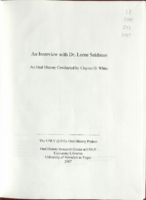
Transcript of interview with Dr. Lorne Seidman by Claytee D. White, November 14, 2006
Date
2006-11-14
Archival Collection
Description
Lawrence Seidman grew up in Cleveland, Ohio. He attended Culver Military Academy the first three years of high school, but graduated from Bay Village High School. He earned a bachelor's degree in business administration, and went on to law school at Case Western Reserve University. Lawrence and his wife moved to Chicago after he finished law school, where he worked in the First National Bank of Chicago doing estate planning and analysis. He wanted to try teaching, so he sent letters to many different schools. Ferris State College in Michigan gave him an interview, and he and his wife moved there for one academic year. The freezing cold winter convinced them that they did not want to stay in the Midwest, so Lawrence began writing letters to schools out west. UNR replied to the letter they received, saying they had no openings, but he might try Nevada Southern University in Las Vegas. The school was in the middle of changing its name to University of Nevada Las Vegas (UNLV). Lawrence flew out, interviewed with future colleagues, and accepted the job. He and his wife have lived in Vegas ever since 1969. Lawrence was the first full-time person hired to teach business law. He restructured the way the courses were developed and presented. A discipline officer was needed after the regents passed a new code of conduct and he was asked to take the position, which he did. Because the administrative or discipline officer reports to the president of the university, he got to know several of them rather well. Eventually, Lawrence became assistant general counsel, and also served as deputy attorney general for a while. His wife Janet pursued her degrees at UNLV, taught for about five years, and then worked at Children's Behavioral Services. Today they are both retired, and are enjoying traveling and working on their home. Lawrence occasionally teaches summer sessions at UNLV.
Text
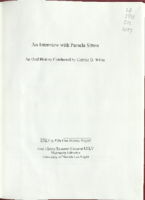
Transcript of interview with Pamela Sitton by Claytee D. White, February 27, 2009
Date
2009-02-27
Archival Collection
Description
Pamela Sitton’s childhood stories follow her construction worker father’s journey from one job to the next. She learned to adjust to a family move at a moment notice, to play in the back of a pickup truck and lived in a series of trailer homes. Finally in 1963, they moved to Las Vegas, where her father worked at the Test Site. For Pam, it was a chance to finish her schooling in one town. She attended the original Las Vegas High School and then UNLV, where she earned a degree in English literature. She recalls the Vegas of the 1960s for her unique perspective—a time of war protests, working a series of part-time jobs from cocktail waitress to post office worker, and her path to marriage in 1973. A position at UNLV’s library had been a dream job that she finally achieved when hired in 1974 as a member of the circulation staff. She held various positions throughout the library and remembers the various library buildings as a student and a professional.
Text
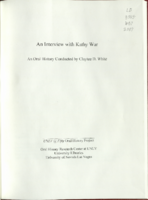
Transcript of interview with Kathy War by Claytee D. White, February 26, 2009
Date
2009-02-26
Archival Collection
Description
Kathy War fondly remembers being raised and educated in Helena, Montana. She and her husband Tom married in 1968 during an uncertain job market. After a short time in Seattle, they came to Las Vegas in 1970. Kathy drew upon her library work experience to apply for a job with UNLV's library. For the next four-and a half years she worked in the Curriculum Materials Library (CML). She then worked in the Inter-Library loan department and eventually moved to Special Collections. As she prepared to retire, she spoke of the growth that had transpired in Special Collections from three positions to ten. She describes the process of archiving over 60,00 photos and mentions the Oral History Research Center as important accomplishments of that department.
Text
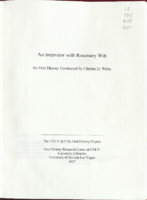
Transcript of interview with Rosemary Witt by Claytee D. White, November 7, 2006
Date
2006-11-07
Archival Collection
Description
Rosemary Witt grew up in the very small town of Columbia, Iowa. She went to a two-room country school in Columbia and attended high school in Knoxville. Her nursing diploma was completed at Iowa Methodist Hospital in Des Moines. She then worked in the operating room for a month or two and switched to pediatrics. When Rosemary's dad fell ill, she moved back to Knoxville to be closer to him and found employment at the VA psychiatric hospital. After five years there, first as staff and then as head nurse, she got the opportunity to attend a nursing program at the University of Iowa which paid tuition and a stipend. She completed her baccalaureate degree, and then worked as an assistant instructor. In the late '60s, Rosemary decided to further her education, and went to the University of Washington in Seattle for her master's in psychiatric nursing. She stayed for three years afterwards to teach on that faculty, and then attended a workshop in Las Vegas in 1971. Rosemary was attracted by the sunshine in Las Vegas, and called UNLV to see if there were any openings. She interviewed and was hired as a psychiatric nurse instructor. In '75 or '76, she decided to pursue her doctorate at the University of Texas in Austin, and persuaded her sister to move to Las Vegas to watch her house and pets while she was away at school. In the many years that she's been at UNLV, Rosemary had served as chair of the nursing program for over thirty of those years. She also served as interim director for a year while a search was conducted for a dean. Today she teaches classes and is involved in research. Rosemary recalls the early days when several disciplines were housed in Frazier Hall. Having spent over thirty years at UNLV, she has seen many changes in the campus and in the city. Today the nursing program has its own school and inhabits most of a large building. She and other instructors are involved in research which improves life for Las Vegans and patients everywhere. She is confident that the nursing school will continue to grow and offer more educational opportunities for students.
Text

Transcript of interview with Barbara Buckley, Kevin Buckley, Michael Buckley, Jill Buckley, and Lindsay Stilwell by Claytee D. White, January 28, 2014
Date
2014-01-28
Archival Collection
Description
Kevin: Stories about the early Pinto Palomino neighborhood, work as a teenager, black-white relations, schooling including Bishop Gorman, and the move to Las Vegas. Barbara: Difference between Flintridge, CA, and Las Vegas in 1968 when the family arrived. Husband served as one of the doctors of Howard Hughes. Community participation and hotel-casino entertainment for young couples, rearing children in Las Vegas.
Text
Pagination
Refine my results
Content Type
Creator or Contributor
Subject
Archival Collection
Digital Project
Resource Type
Year
Material Type
Place
Language
